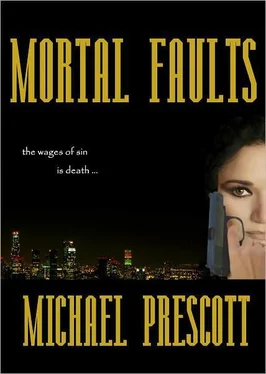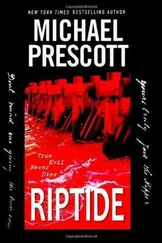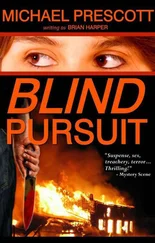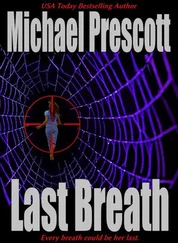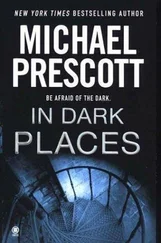Michael Prescott - Mortal Faults
Здесь есть возможность читать онлайн «Michael Prescott - Mortal Faults» весь текст электронной книги совершенно бесплатно (целиком полную версию без сокращений). В некоторых случаях можно слушать аудио, скачать через торрент в формате fb2 и присутствует краткое содержание. Жанр: Триллер, на английском языке. Описание произведения, (предисловие) а так же отзывы посетителей доступны на портале библиотеки ЛибКат.
- Название:Mortal Faults
- Автор:
- Жанр:
- Год:неизвестен
- ISBN:нет данных
- Рейтинг книги:4 / 5. Голосов: 1
-
Избранное:Добавить в избранное
- Отзывы:
-
Ваша оценка:
- 80
- 1
- 2
- 3
- 4
- 5
Mortal Faults: краткое содержание, описание и аннотация
Предлагаем к чтению аннотацию, описание, краткое содержание или предисловие (зависит от того, что написал сам автор книги «Mortal Faults»). Если вы не нашли необходимую информацию о книге — напишите в комментариях, мы постараемся отыскать её.
Mortal Faults — читать онлайн бесплатно полную книгу (весь текст) целиком
Ниже представлен текст книги, разбитый по страницам. Система сохранения места последней прочитанной страницы, позволяет с удобством читать онлайн бесплатно книгу «Mortal Faults», без необходимости каждый раз заново искать на чём Вы остановились. Поставьте закладку, и сможете в любой момент перейти на страницу, на которой закончили чтение.
Интервал:
Закладка:
Before leaving, she asked one of the volunteers about the man, who was evidently the big kahuna around here.
“That’s Mr. Stenzel,” she was told. “Kipland Stenzel. Our campaign manager. You’ve probably seen him on TV. He did an interview on Prime Story last week.”
Abby had never heard of Prime Story, but she nodded as if the information were meaningful. She departed with a handful of campaign propaganda, which she reviewed in her car. One of the brochures provided a schedule of Reynolds’ public appearances, including the town hall meeting tonight.
Rose Moran, or whoever the woman was, could have picked up the schedule at any time, just by stopping at the office. Reynolds was making it too easy for her. It was tough to foil a stalker when you advertised your every move.
Then again, foiling a stalker wasn’t Reynolds’ job. It was hers.
She adjusted her position on the bench and thought about the congressman. His story made a rough sort of sense, but she still had the uncomfortable suspicion that he was hiding something. He’d claimed not to have a single photograph of his housekeeper-no snapshot taken at a family dinner or holiday get-together, no picture of her with the kids. Unlikely. Then there was the protective-father act. He wanted to keep his son out of the headlines. Very noble, but Reynolds didn’t strike her as the noble type. He was calculating and shrewd, genial when he needed to be, but cold to the touch if you got too close.
She made her living with her intuition. Other people might rely on linear, left-brain thinking, but she’d always been more of a right-brain gal. She saw things holistically. She trusted her inner voice. And her inner voice was saying that Reynolds needed to be handled with care.
Shortly past seven, cars started arriving for the event. Abby pretended to read a copy of the Orange County Register in the slanting sunlight while surreptitiously checking out each vehicle as it drove in. To keep herself alert she counted the cars. With number thirty-eight, she hit the jackpot.
A white Chevrolet Malibu, not new. The blond woman at the wheel. Abby saw her clearly as the car slowed to roll over the first of several speed bumps in the parking lot.
She kept her eye on the Malibu as it crept through rows of parked cars and found a space. The woman got out and headed into the high school. She went quickly, head down, shoulders hunched, as if walking into a strong wind-but there was no wind. She was just someone who liked to keep her head down, someone who might have something to hide. She wore a coat that was a bit too heavy for a summer evening, and Abby was glad there was a metal detector at the door.
Abby waited until the full crowd had arrived-a decent turnout, at least a hundred people. No TV news vans, though. The Southern California media were continuing their tradition of ignoring local politics, a policy that suited a community built on narcissistic self-absorption. Abby couldn’t complain. She paid no attention to politics, either.
The last person to show up for the event was Reynolds himself. In the movies, politicians were always riding around in limousines, but real life was more prosaic; Reynolds drove a Ford minivan. Stenzel, she noticed, was his passenger. Abby watched them go in.
She left the bus stop and sauntered into the parking lot, holding her key ring as if she were looking for her car. Actually her car was parked around the corner. It was the Malibu that interested her.
She memorized the tag number-a California plate, no surprise. The license plate frame advertised a dealer in the San Fernando Valley, the vast smoggy basin north of the Hollywood Hills. Possibly the owner lived there. If so, she wasn’t one of Reynolds’ constituents.
Abby took a peek through the side window. A schedule of Reynolds’ public appearances, identical to the one she’d taken from the campaign office, lay on the passenger seat. Next to it was an Orange County map book, turned to the Laguna Hills page. Apparently the woman wasn’t familiar with the area-more evidence she lived outside Reynolds’ district.
Of course, there was one easy way to find out where she lived, and that was to follow her home.
The town hall meeting broke up just before nine. By then, even the long summer twilight had yielded to darkness.
Abby liked the dark. It cloaked her.
She had picked up her car and parked down the street from the high school, where she could watch the departing vehicles. A street light at the exit of the parking lot made it easy to spot the white Malibu as it pulled out. Abby merged with the flow of traffic and followed.
She expected the Chevy to head for the San Diego Freeway, and she was right. The car took the northbound lanes, staying well within the speed limit. Abby hung back by several car lengths, allowing another vehicle or two to occupy the intervening space from time to time.
Even at a distance, the Chevy wasn’t difficult to follow. Abby had taken the precaution of breaking its left taillight. She could hold the single taillight in view and be sure the target hadn’t been lost.
Under other circumstances she might have risked following closer, but tonight there was the problem of her car. When on assignment, she ordinarily drove a beat-up Hyundai that she stored in a spare parking space in the Wilshire Royal’s underground garage. Today, not expecting to go undercover, she’d driven her Mazda Miata to the congressman’s office. It was a bright red, sporty little two-seater convertible, and even with the top up it stood out more than she would have liked.
Most drivers would never notice a car behind them, no matter what the make or model. But something in this woman’s hunched shoulders and quick, frightened stride had suggested paranoia, and paranoia had a way of making people vigilant. Abby had dealt with plenty of paranoid types. There were lots of them-lonely people, prickly, insecure, alienated. She felt their nervous glances in supermarkets. She saw their pale faces in crowds. Sometimes she feared that her own face must look like theirs in her unguarded moments. How many Leon Trotmans could she get to know before she became one of them?
The Chevy left Orange County and passed through the crowded confines of West L.A., then crossed into the San Fernando Valley, a grid of suburban streets lined with single-family homes. The Valley was an immense openness, flat, broad, sprawling to the far horizons. As was true of any large community, there were affluent sections and poorer spots. Judging by the age of the Chevy Malibu, Abby figured they weren’t heading for a high-rent district.
The car kept going, into the northwest part of the Valley, which was dominated by aging industrial concerns. Finally the one working taillight began to pulse. The Chevy was taking the Mission San Fernando exit.
On surface streets it passed through San Fernando, a small city carved out of county land. Traffic was light, and Abby stayed back, keeping the single taillight barely in view. Then the car turned down a side street, and she had a decision to make. If she followed, she might be spotted, but if she continued going straight, she might lose the target.
She compromised, pulling onto the shoulder and slowing. By the time she took the corner, the Chevy was far ahead. It pulled into the driveway of a house and was illuminated by a light inside the carport. Abby killed her headlights and parked up the street, watching as the driver emerged.
She wasn’t a blond anymore. She’d taken off the wig. Her hair was brownish, cut short, framing a square, pale face, a face with good bone structure half hidden in too much flesh. She would have been attractive when she was younger, but she’d let herself go. Abby put her age at fifty or thereabouts, but she moved with a curious stiffness, like a very old person-or like someone in pain.
Читать дальшеИнтервал:
Закладка:
Похожие книги на «Mortal Faults»
Представляем Вашему вниманию похожие книги на «Mortal Faults» списком для выбора. Мы отобрали схожую по названию и смыслу литературу в надежде предоставить читателям больше вариантов отыскать новые, интересные, ещё непрочитанные произведения.
Обсуждение, отзывы о книге «Mortal Faults» и просто собственные мнения читателей. Оставьте ваши комментарии, напишите, что Вы думаете о произведении, его смысле или главных героях. Укажите что конкретно понравилось, а что нет, и почему Вы так считаете.
